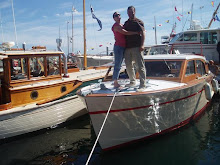Lately, my personal journey (Care and I's decision to radically downsize) has also given me plenty to ponder professionally. After years of teaching and facilitating Lean principles in the workplace, the real meaning of the cost of excess inventory has come home, literally.
Stuff, things that do not contribute directly to your quality of life and or the relationships with your friends and family, that do not help create value, just like in business cost you time, money, and quality. In business, this is called "inventory," one of Toyota's eight wastes. Inventory ties up financial resources, takes up space, takes time to move, care for and account for, as well as hiding underlying problems in your processes, such as constraints, and is rarely easily found when you really need it.
Why then, personally or professionally do we insist on packing all this stuff around with us? The answer I believe can be summarized in one emotion; fear. We tell ourselves: I might not have another of these available should I ever need it, or, I might need this someday, or, I might run across somebody who will pay me good money for this, or, if I keep this long enough it will have real value. We look for data to validate this viewpoint, watching intently shows like "Treasure in the Attic" and "Antiques Roadshow." What we miss is that usually people inherit these "treasures" from some lonely aunt or uncle who hoarded this stuff and then died. The other point we miss, is that you don't get a plug nickel until you take it out of the box or curio cabinet and sell it. Unless it contributes directly to the things you and your loved ones value, it has no value.
For me it went a lot further than just traditional collectibles. I have also spent years hoarding materials and tools. Being a very creative person, I am constantly building or making things. In the past there have projects that I could not start or finish because of a lack of material, or that were difficult to complete because I had the wrong tools. Out of frustration or fear, I thought, if I just had more stuff, materials or tools I would be free to create at will, or at least trade or barter for what I needed. I spent years thinking, if I just had more space/ tools/ money/time/ stuff I could truly create unfettered. Meanwhile, the space I did have became filled with stuff I might need, my tools became lost or damaged, my money was tied up in inventory and buying parts to fix the stuff I already had, I spent most of my time trying to keep all the stuff I already had safe while moving it out of the way, and all that stuff instead of freeing me became a cage.
So I was sitting in a meeting today with the Captain of the shipyard, an SES(Senior Executive Service-civilian) , and a bunch of of GS-15's and 14's, and they were discussing process improvement, and how it manifests physically in the working spaces of the shipyard. I was hearing the same thing I had been telling myself. What we really need is more time, space, resources, until one of them piped up and commented that in the private sector Lean event teams are told up front, no more time, money, space. At first glance, this might seem stingy. We are asking people to look at their processes and come up with solutions to save time/ money and or produce better quality, and we think that comes for free? Drawing from my own professional experiences, I joined the conversation and shared that it was real common for me to hear a team talk about needing more (fill in the blank) the first time you visited an area, but, that if they rigorously applied Lean principles, such as 5-S, that by the time you came back again, they were discussing what to do with the excess, and how to keep slipping back into their old habits. In summary, I told them, that our challenge was to look at our world from a perspective of plenty, and not from the world of scarcity we are in the habit of seeing.
When we are honest with ourselves about how much we haven't used or have wasted, we realize that what is really holding us back from producing real value is not a lack of resources, but our own inability to see what we can do with what we already have.
Subscribe to:
Post Comments (Atom)


No comments:
Post a Comment